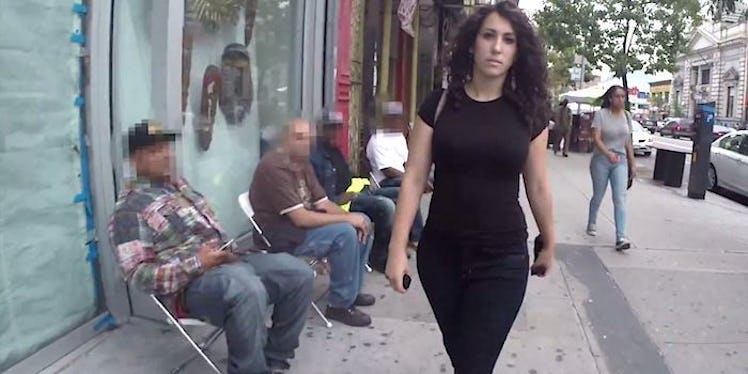
You Make Me Stronger: 5 Reasons Why I'm Thankful For The Catcalling Cowards
It's International Anti-Street Harassment Week and many people are left wondering why we still have to talk about this.
Last fall, as catcalling quickly became a buzz word, I noticed fewer harassers on the streets as the months went on.
I was hopeful, after catcalling became a trending word on every site and newscast, street harassment would naturally subside.
Surely, every catcalling culprit on my street had caught wind of our feminist blogs and videos and taken the hint.
My optimism ran thin when I came to the realization that the reason I hadn't been catcalled as much was because I traded in my summer shorts for a full-length parka, and the winter temperatures were keeping the cat-callers domestic.
Now that the sun has reappeared out, the cat-callers are slowly crawling out of hiding, back to claim what they mistakenly think is theirs.
In a strange turn of events, however, the power they fail to gain via hollering at people on the street has, in turn, empowered us on a global level.
For that, and the following reasons, I am grateful to the cat-callers:
Thank you for starting a dialogue.
Last fall, through the Elite Daily video team, I sat in Ileana Jimenez's classroom, also known as the Feminist Teacher, as she spoke with her high school students about street harassment.
When asked who in the room had been street harassed, I was taken aback by how many young women raised their hands, along with some of the men in the classroom.
Throughout the course of the class, I was able to sit down with each student individually and talk to them about their beliefs regarding intersectionality.
Before creating a video on the class, I was sure I was doing a piece about street harassment and feminism. But, after speaking with students of different races, religious backgrounds and sexes, I realized the problem spanned far more than that.
Thank you for giving me the courage to stand up for myself.
In the class, I met a student named Shana who was a junior at the high school. She shared with me that she has been experiencing street harassment since the age of 9, and at age 17, it was at an all-time high.
She is far from being alone with this statement.
A recent study with Hollaback! revealed 85 percent of US women surveyed report experiencing street harassment before the age of 17, and 67 percent of women report experiencing it before age 14.
Living in New York City, Shana said she never stood up for herself, but after taking this course, she had the courage to say something to people who demean her.
If Shana could do it, I knew I could, too.
Thank you for making me feel empowered.
Elite Daily is full of young men and women who express themselves openly through their clothing, actions and, of course, their articles and videos.
I can't tell you how empowering it is to have a respected writer walk in wearing studded boots and a short skirt, and when I ask her if she gets catcalled she matter-of-factly responds, “It doesn't matter, I'm not here for them.”
These are the years to express yourself. You are figuring out who you are and who you want to be as a person.
You have people older than you trying to figure out what makes our generation tick and people younger than you trying to embody your style.
Catcalling helped me realize I should never be concerned with what I'm wearing with cat-callers in mind, but to be more concerned with wearing something that empowers me.
Thank you for bringing people together.
The same Hollaback! study showed that while 46 percent of US men reported experiencing no harassment in recent years, only 3 percent of US women could say the same.
Perhaps, most importantly, what the movement against catcalling brought to both men and women's attention was they could use each other as allies; they were not in this alone.
What came as a surprise to me was that a few people in Ileana's feminism course said they faced no discrimination.
One high school senior by the name of Jeremy said he felt pretty privileged, but he wanted to learn how to use that advantage to help people.
Now, if Jeremy witnesses street harassment, he said he would hope to never act as a bystander.
Through catcalling, people like Jeremy have not only learned how to stand up for victimized men and women, but how to empower them, as well.
Thank you for creating a movement.
The other day when I was walking home with my roommate, a man hollered at us a few times on his bike right on our street.
What I usually would have ignored, I channeled into a dignified declaration: “We do not appreciate catcalling!”
He seemed caught off-guard, responded sheepishly, “Damn, can't hate a guy for trying,” and rode off.
So many other scenarios played out in my head of how I could have handled that situation, but I was grateful I had a word to express how I felt I was being treated, and he knew to back off.
Regardless of his response, I am grateful there was a direct line of understanding -- that alone means the movement is making waves.